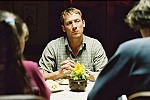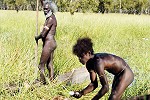 Arthouse films ’06
Arthouse films ’06< < M O R E | M O R E > >
last update 7.Nov.06
See also: SHADOWS FILM FESTIVAL | SHORT FILMS
 R E V I E W B Y R I C H C L I N E
R E V I E W B Y R I C H C L I N E Antikörper
Antikörper
 This psychological horror film may feel like a hybrid of The Silence of the Lambs and Seven, but just as we think we have it figured out, the filmmaker twists it into something startlingly emotional.
This psychological horror film may feel like a hybrid of The Silence of the Lambs and Seven, but just as we think we have it figured out, the filmmaker twists it into something startlingly emotional.
When vicious serial killer Engel (Hennicke) is caught in Berlin, the residents of a country town are happy to put to rest an 18-month-old unsolved murder. But local part-time cop Michael (Möhring) isn't so sure. Eerily, the articulate murderer will only talk to Michael, so the big city cop (Hoenig) reluctantly brings this young farmer into the case. And as Engel messes with his head, Michael's obsession with the case strains his relationship with his wife (Krumbiegel) and children (Diekamp and Szalski), and destroys his credibility back home.
Witty and creepy encounters between a freakishly brilliant killer and a novice cop are always gripping, especially when they start delving into each other's mind in a race against time. Filmmaker Alvart shoots in a gritty, urgent style, cleverly editing images together to offer insidious insights into the characters. The story is a tricky blending of good and evil with an intriguing religious undercurrent. It skilfully contrasts rural and urban settings, setting Engel's sick crimes against this tense family's pastoral surroundings.
And the cast members dive in with introspective performances--the characters are shaded and conflicted, yet they're all surprisingly sympathetic as well. Möhring adds a wonderful texture to the likeable and naive good guy who's slowly becoming dangerously unhinged. Hennicke sneers and chews the scenery expertly, daring to make the obvious comparison ("Were you expecting Hannibal Lecter?") while holding his own. And Hoenig adds some badly needed comical bluster.
Where the film becomes something much more intriguing is in the characters' internal desperations. Each person is sharply defined, and they're all after something different. Alvart digs deeply into them, layering in all kinds of gripping story turns and provocative observations. And in the end he actually manages to come up with an original, surprising way to conclude the story. It's a sequence that sends chills down the spine again and again. And marks him as a filmmaker to watch.
with Wotan Wilke Möhring, Heinz Hoenig, André Hennicke, Ulrike Krumbiegel, Hauke Diekamp, Laura Alberta Szalski, Norman Reedus, Nina Proll, Klaus Zmorek, Jürgen Schornagel, Gudrun Ritter, Isabel Bongard
 release Ger 7.Jul.05,
release Ger 7.Jul.05, UK 17.Nov.06,
US 16.Feb.07
05/Germany 2h02
7.Nov.06
 R E V I E W B Y R I C H C L I N E
R E V I E W B Y R I C H C L I N E Dans Paris
Dans Paris
 With a tone that's both playful and emotional, Honoré takes an entertaining look at family relationships with the help of terrific performances by Garrel and Duris.
With a tone that's both playful and emotional, Honoré takes an entertaining look at family relationships with the help of terrific performances by Garrel and Duris.
It's Christmas in Paris, and Paul (Duris) is thoroughly depressed because his girlfriend (Preiss) has dumped him. Back in his father's flat, his younger brother Jonathan (Garrel) tries to lure him out into the city, but becomes distracted by every girl he meets--both strangers (Noguerra, Hettmann and El Zein) and an ex (Butaud). Meanwhile, their dad (Marchand) is still not over the fact that their mother (Pisier) left him following a family tragedy. But together they might get through the holiday, and emerge a little closer than before.
Honoré films this with a cheeky eye, using long takes and acting that's full of personality and humour. Garrel narrates to camera in a disarmingly sardonic style; he's a likeable rogue, bedding women across Paris and still managing to cheer up his brother. Duris is terrific as a guy who's probably not as depressed as he'd like to be--or as he wants others to think he is. Together, they have a sublime camaraderie that's both physical and emotional. And Marchand is superb as well, hovering around the edges like an annoyed puppy.
The female roles are less sympathetic. After all, we're seeing this from the boys' perspective, and to them women are either pushy or vacuous. Although in these actress' hands, the characters become complicated and intriguing; we can see why the men are so hooked. And through flashbacks we begin to understand the background of each relationship--from infatuation to compassion to loathing, and back.
The film is a collage of emotions, shifting through scenes that are happy, silly, angry, sexy, even sad. Jonathan's perky little brother, Paul's moody loser in love and Dad's pestering combine to create a realistic, telling look at messy relationships. But Honoré makes sure it never gets too heavy, keeping the tone frothy and the pace nimble, dropping in witty references (such as Jonathan reading Franny & Zooey), telling cutaways and some seriously lovely scenes that show how affection lives on even after a relationship collapses.
with Louis Garrel, Romain Duris, Guy Marchand, Marie-France Pisier, Joana Preiss, Alice Butaud, Héléna Noguerra, Annabelle Hettmann, Lou Rambert-Preiss, Judith El Zein, Mathieu Funck-Brentano
 release Fr 4.Oct.06,
release Fr 4.Oct.06, UK 4.May.07,
US 10.Aug.07
06/France Gémini 1h33
CANNES FILM FEST

27.Oct.06 lff
 R E V I E W B Y R I C H C L I N E
R E V I E W B Y R I C H C L I N E
 Basically a tribute concert film punctuated with talking-head interview footage, this documentary is extremely interesting as it recounts a remarkable life story, but it fails to get beneath the surface of either the man or his music.
Basically a tribute concert film punctuated with talking-head interview footage, this documentary is extremely interesting as it recounts a remarkable life story, but it fails to get beneath the surface of either the man or his music.
The film consists mainly of a group of musicians performing the songs of Leonard Cohen, each in their own style, on stage in Sydney in January 2005. This is intercut with the performers and others talking about the music and the man they have all come to know. Most importantly, Cohen himself adds his observations about the artists and then recounts his own life story, accompanied by film clips and stills, tracing his childhood, his career and his intriguing religious journey from Jewishness to Christianity to Zen Buddhism.
Essentially the film revels in Cohen's stature as a poet, and the stress on his words probably explains why the filmmakers only show him singing one song--a gorgeous rendition of Tower of Song, accompanied by U2 in a cheesy lounge-style set. This is easily the high point of the film, and it makes us wish we could have seen Cohen performing his own work. He's a charmingly articulate talker, but the filmmakers never provoke him to speak about anything beyond how he grew up and how he writes. We never really feel like we understand who he is or what drives him.
It's also a fairly simplistically assembled film, just cutting back and forth between the soulful musical numbers and interviews filmed in close-up. His songs require artists who can sing from the inside out, so the assembled company here is remarkable, and many of their performances are haunting. But they don't hold a candle to Cohen's own expressive rasp. The interviews for the most part paint a wonderfully engaging portrait of the songwriter and his songs, and how they have real power to, as Bono says, grab you at every stage in your life. But they never really get beneath the skin. And in many ways, just watching Cohen sing these songs himself would have filled in those gaps.
with Leonard Cohen, Rufus Wainwright, Bono, The Edge, Martha Wainwright, Nick Cave, Beth Orton, Jarvis Cocker, Antony Hegarty, Linda Thompson, Perla Batalla, Julie Christensen
 release US 21.Jun.06,
release US 21.Jun.06, UK 24.Nov.06
06/US Lionsgate 1h43
BERLINALE
TORONTO FILM FEST
1.Nov.06
 R E V I E W B Y R I C H C L I N E
R E V I E W B Y R I C H C L I N E
 MUST-SEE
MUST-SEE
 An engaging story about storytelling, this is also the first all-aboriginal Australian film, spinning a myth nearly a thousand years old with sharp comedy and wryly astute observations.
An engaging story about storytelling, this is also the first all-aboriginal Australian film, spinning a myth nearly a thousand years old with sharp comedy and wryly astute observations.
The Storyteller (David Gulpilil) begins, "Once upon a time in a land far, far away," then laughs, "I'm only joking," before plunging us into a meandering narrative about his ancestor Minygululu and his younger brother Dayindi (Jamie, David's son), on a hunting expedition during which they build canoes and head into Northern Territory swamplands to hunt geese. As they go, Minygululu tells his brother a pertinent tale about the ancients: a man (Kurddal) with three wives (wise Djarrabalminym, jealous Djulibing and seductive Baker) and a younger brother (Jamie again) who wants one of them.
"A good story must have a proper telling," Minygululu says repeatedly, forcing Dayindi to be patient as he takes several days to reveal each wrinkle and twist in the tale, which involves an interloper (Dawu), a possible kidnapping and a terrifying payback ceremony. There's also a constant stream of earthy humour as the men tease each other and worry about every possible outcome, and the women argue about their husbands, "like they always do".
Alongside the witty tone, the film is brilliantly well-paced and technically exquisite. Ian Jones' gliding wide-screen cinematography is gorgeous, with the framing story shot in strikingly luxuriant monochrome and the story within the story filmed in vibrant, earthy colours. The cameras catch both the natural settings and the character-filled faces, and the astonishing sound mix adds vivid ambience.
It would also be difficult to overstate the film's value as an anthropological document. It really looks like we're witnessing actual events from centuries ago, with details of the culture and lifestyle that are deeply involving. Watching the hunters make their canoes, build platforms to protect against crocs and stalk geese is as fascinating as the human drama of the ancient villagers. The film not only reminds us that people everywhere deal with the same things in the same ways, but it also amusingly affirms the value of great storytelling.
narr David Gulpilil Ridjimiraril Dalaithngu
with Crusoe Kurddal, Jamie Dayindi Gulpilil Dalaithngu, Richard Birrinbirrin, Philip Gudthaykudthay, Peter Minygululu, Sonia Djarrabalminym, Frances Djulibing, Cassandra Malangarri Baker, Johnny Buniyira, Michael Dawu, Bobby Bununggurr, Peter Djigirr
 release Aus 29.Jun.06,
release Aus 29.Jun.06, US 25.May.07,
UK 1.Jun.07
06/Australia 1h31
CANNES FILM FEST
LONDON FILM FEST
2.Nov.06 lff


See also: SHADOWS FILM FESTIVAL | SHORT FILMS
© 2006 by Rich Cline, Shadows
on the Wall
